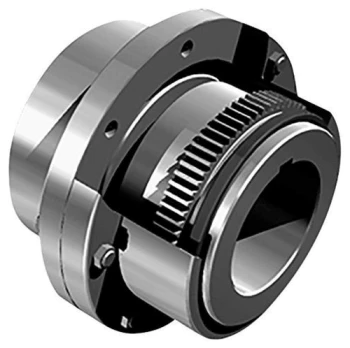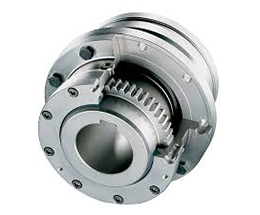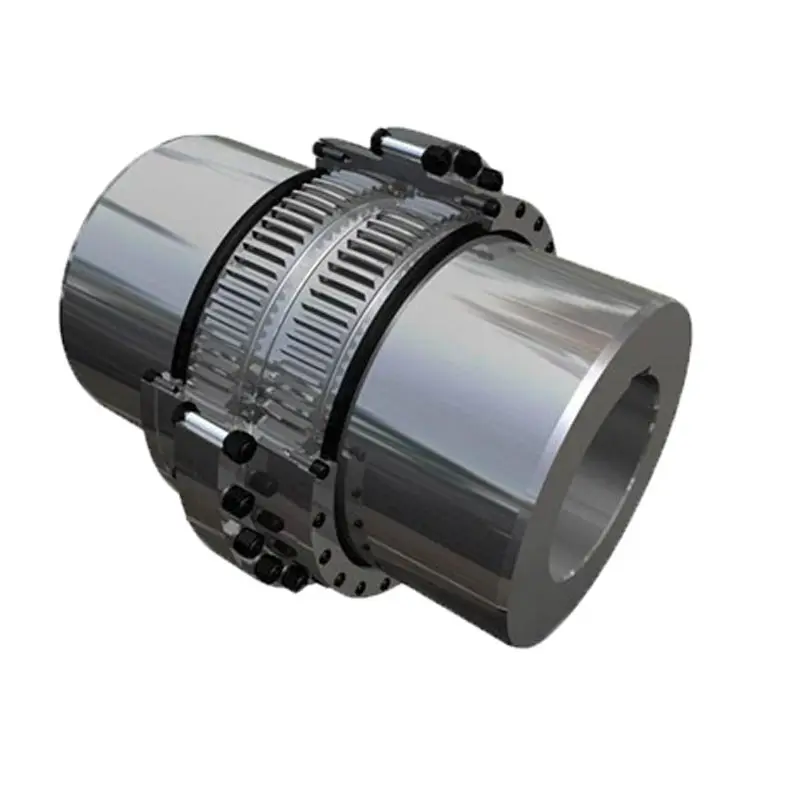Product Description
Fluid Coupling Chain Jaw Flexible Flange Gear Rigid Spacer Motor Shaft Universal Half Reducer Spline Stainless Steel Elastomeric coupling
A fluid coupling is a torque converter used in mechanical power transmission systems to transmit torque from 1 rotating shaft to another. It consists of 2 halves, the impeller, and the runner, which are placed in a housing filled with a hydraulic fluid such as oil or water.
When one-half of the fluid coupling is rotated, it creates a fluid flow within the housing, which in turn causes the other half to rotate. The fluid coupling uses fluid dynamics principles to transmit torque between the 2 halves, with the amount of torque being proportional to the speed difference between the 2 shafts.
One of the key advantages of a fluid coupling is its ability to provide a smooth and gradual torque transfer between the 2 shafts, without any mechanical connection. This can help to reduce wear and tear on the equipment and improve overall system efficiency.
Fluid couplings are commonly used in various industrial applications, including mining, construction, and marine equipment. They are also used in automotive transmissions, where they can help provide a smooth and efficient torque transfer between the engine and the wheels.
Overall, a fluid coupling provides a reliable and efficient way to transmit torque between 2 rotating shafts, without any mechanical connection. With their ability to provide a smooth and gradual torque transfer, they are a popular choice for a wide range of industrial and automotive applications.

Materials Used in Manufacturing Flexible Gear Couplings and Their Impact on Performance
Flexible gear couplings are designed to transmit torque while accommodating misalignments and reducing vibrations. The choice of materials for manufacturing these couplings plays a crucial role in their overall performance and suitability for specific applications. Some common materials used in flexible gear couplings include:
- Steel: Steel is a popular material for flexible gear couplings due to its high strength and durability. It can handle substantial torque loads and provides good resistance to wear and fatigue. Steel couplings are commonly used in heavy-duty applications, such as steel mills, mining, and power generation.
- Stainless Steel: Stainless steel is used when corrosion resistance is required, making it suitable for applications in corrosive environments like the marine, chemical, and petrochemical industries.
- Alloy Steel: Alloy steel is used to improve specific properties, such as hardness and heat resistance. It is often employed in high-temperature applications found in steel processing and power generation.
- Cast Iron: Cast iron is known for its excellent wear resistance and damping capabilities. It is used in applications where shock absorption and vibration reduction are critical, such as pumps and compressors.
- Aluminum: Aluminum is lightweight and offers good corrosion resistance, making it suitable for applications where weight reduction is important, such as aerospace and certain industrial machinery.
- Bronze: Bronze is used for its self-lubricating properties and resistance to wear. It is often found in couplings used in low-speed applications, such as conveyor systems.
- Nylon and Plastics: Nylon and other plastics are used in some couplings where electrical isolation and lightweight properties are essential, such as in medical equipment and certain automation systems.
The selection of materials depends on the specific requirements of the application, including torque, speed, temperature, environmental conditions, and the presence of corrosive substances. Proper material selection ensures that the flexible gear coupling can operate efficiently and reliably, providing optimal performance and minimizing maintenance needs.

Reduction of Noise and Damping of Vibrations in Mechanical Systems Using Flexible Gear Couplings
Flexible gear couplings can effectively reduce noise and dampen vibrations in mechanical systems due to their unique design and material properties. The key factors contributing to noise reduction and vibration damping are as follows:
- Tooth Profile: Flexible gear couplings use gear teeth with specially designed profiles that help in smoother meshing and engagement. The teeth geometry allows for gradual contact, minimizing impact and noise during torque transmission.
- Metallic Flexibility: The flexibility of the coupling’s metallic components helps in absorbing and dissipating vibrations generated during operation. This flexibility prevents vibrations from propagating throughout the system, reducing overall noise levels.
- Resonance Damping: Flexible gear couplings can dampen resonant vibrations that might occur in the system. Resonance can lead to increased noise and mechanical stress, but the damping effect of the coupling helps to mitigate these issues.
- Torsional Stiffness: While flexible gear couplings offer flexibility, they also provide sufficient torsional stiffness, ensuring smooth and precise torque transmission. This stiffness prevents excessive torsional vibrations from being transmitted to connected components.
- Misalignment Compensation: The ability of flexible gear couplings to accommodate misalignments between shafts further reduces mechanical stress and vibrations, enhancing the overall performance of the system.
Due to these features, flexible gear couplings are commonly used in applications where noise reduction and vibration damping are crucial. They find applications in various industries, including heavy machinery, steel mills, power generation, and pulp and paper manufacturing, where smooth and quiet operation is essential for the efficiency and longevity of the equipment.

Industry Standards and Certifications for Flexible Gear Couplings
Flexible gear couplings are essential components in mechanical power transmission systems, and there are industry standards and certifications that govern their design, manufacturing, and performance. Some of the most commonly recognized standards and certifications for flexible gear couplings include:
- ISO 9001: This certification ensures that the manufacturer follows a quality management system that meets international standards, ensuring consistent and reliable production of flexible gear couplings.
- AGMA Standards: The American Gear Manufacturers Association (AGMA) has published various standards related to gear couplings, including AGMA 9002 for flexible couplings, which provides guidelines for design, selection, installation, and lubrication.
- API Standards: The American Petroleum Institute (API) has established standards for couplings used in the oil and gas industry. API 671 specifically covers the requirements for special-purpose couplings, including gear couplings, used in petroleum, chemical, and gas industry services.
- CE Marking: The CE marking indicates that the flexible gear coupling complies with the European Union’s health, safety, and environmental protection standards, making it eligible for sale within the EU market.
- ATEX Certification: If the flexible gear coupling is intended for use in potentially explosive atmospheres, it may require ATEX certification, which ensures compliance with European Union directives for explosive atmosphere protection.
When selecting a flexible gear coupling, it is essential to verify if it conforms to the necessary industry standards and certifications to ensure the coupling’s performance, safety, and reliability in your specific application.


editor by CX 2023-11-16